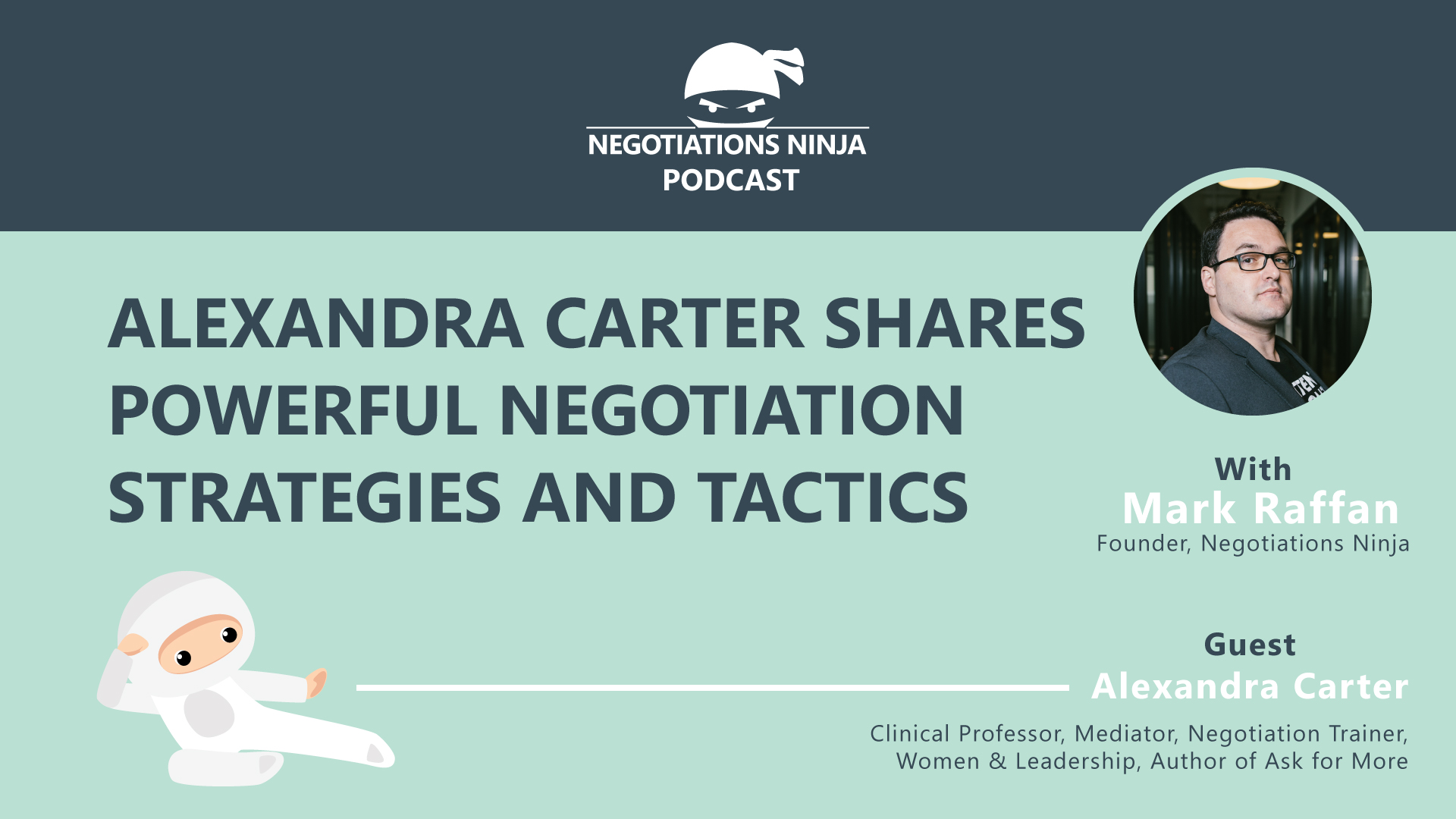The negotiation strategies and tactics that you utilize can make a powerful difference in the outcome of your negotiation. How do you handle objections? What is the focus of your negotiation? Do you ask open-ended questions? Every step of the process is helped by the right negotiation strategies. In this episode of Negotiations Ninja, Alexandra Carter shares her insight into the world of negotiation. Don’t miss it!
Alexandra Carter is the Director of the Columbia Law School’s Mediation Clinic. She is a professor that focuses on teaching mediation and dispute resolution in negotiation. She recently published her book: Ask for More: 10 Questions to Negotiate Anything. Alexandra is a world-renowned negotiation trainer for the United Nations and has taught numerous negotiation workshops to hundreds of diplomats. Her expertise is unquestionable.
Outline of This Episode
- [1:36] Alexandra’s background in negotiation
- [2:06] Public negotiations vs. business negotiations
- [3:41] Shift the focus toward determining the core problem
- [6:32] The power of silence in the negotiation process
- [11:32] How fear and guilt influence a negotiation
- [17:00] A discussion of Alexandra’s book: Ask for More
Key differences between public negotiations and business negotiations
Alexandra has been involved in numerous high-profile negotiations and notes there are some key differences between these large public negotiations and small-scale business negotiations. Namely, negotiations in the public sphere are usually large multi-party negotiations dealing with different procedural and substantive issues.
To understand a counterparts’ behavior, you often have to think about the invisible groups that are influencing their decision-making. A table of people can be representing multiple different groups so you HAVE to think about the different audiences they’re catering to and how it impacts each move they make.
Shift your negotiation from the desired outcome to the core problem
Alexandra notes that in times of crisis we often approach negotiations from the wrong place. We try to immediately jump to solutions or we bury our head in the sand and wait for things to pass over. She emphasizes that “The first critical step that a lot of people skip in negotiation is figuring out what problem to solve. That’s a lot of the key of negotiation success—and even innovation success—in companies. Sit down first and think about the problem you’re trying to solve and then think about the problem they’re trying to solve.” If you start anywhere with negotiation strategies and tactics—that is the place.
Alexandra shares an example of a business owner struggling with cash flow issues during the Coronavirus Pandemic. The business owner wants to negotiate their commercial lease to alleviate some of their cash flow issues. Do they negotiate a 3-month rent reduction while they pivot their business? How will that impact the lease holder? If you start with and focus on the core problem—for yourself and your counterpart—your negotiation tactics must develop and flow from there.
Negotiation strategies and tactics: The power of asking the right question
A great negotiation strategy is utilizing silence. Silence is uncomfortable—but powerful. Alexandra believes that “Silence is proportionate to how good a question you just asked.” When you ask a great question there should be silence on the other end. It shows that the question was thought-provoking and compelling enough that they have to search for a solution.
Asking open-ended questions is a great negotiation tactic to get people to over-answer with things their lawyer didn’t want them to say. Silence often forces people to fill the awkwardness with something they were thinking—but trying not to say. Asking the right questions and leaving room for silence can be a game-changer in your negotiation.
Alexandra’s new book is all about this topic. In her book, she flips the script on the definition of negotiation. She also shares 10 research-backed questions that yield incredible results in negotiations. She firmly believes that asking better questions yields better answers—and better results.
The ‘Big Two’ emotions that influence a negotiation
The two big emotions that Alexandra sees more than anything else are “fear” and “guilt.” They have the power to blow up a negotiation more than any other emotion. Why? Because people don’t want to express those emotions so they try to mask them. Doing so causes fear and guilt to come out as anger.
When you’re negotiating in a crisis every element of a negotiation is affected: cognition, processing, emotional reactivity, self-regulation, etc. People are often afraid of the consequences to their business and lives. How does a negotiation impact their employees, family, health, and business? They feel guilty about not being better prepared to handle the crisis they’re dealing with. All of those emotions come boiling out as anger.
So how do you handle those emotions during a negotiation? What is the best negotiation strategy or tactic to turn things around? Listen to the rest of the episode to hear Alexandra explain the TWO powerful negotiation tools she uses to influence a negotiation towards success.
Resources & People Mentioned
Connect with Alex Carter
- Personal Website
- Connect on LinkedIn
- Follow on Twitter
Connect With Mark
- Follow Negotiations Ninja on Twitter: @NegotiationPod
- Connect with Mark on LinkedIn
- Follow Negotiations Ninja on LinkedIn
- Connect on Instagram: @NegotiationPod
- negotiations.ninja




